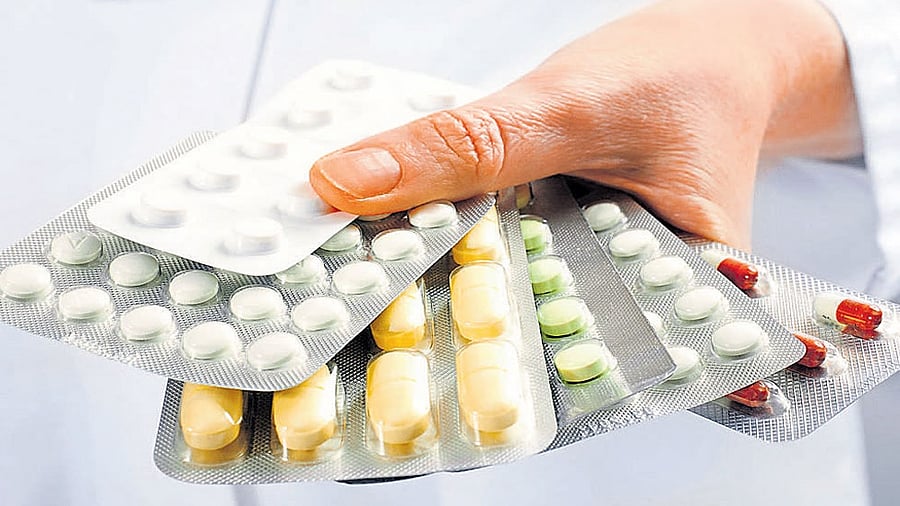
Representative image of pharma exports.
Credit: iStock Photo
Bengaluru: The proposed 100 per cent tariff on branded and patented pharmaceutical imports from October 1 by the Trump administration is unlikely to have an immediate impact on Indian exports, as the bulk of India's contribution lies in simple generics.
Most large Indian companies already operate US manufacturing or repackaging units and are exploring further acquisitions.
India accounts for about 47% of the US's requirement of affordable, high-quality generic medicines.
"The decision to impose a 100% tariff on pharma imports from October 1 is for branded and patented drugs, while India predominantly exports generic drugs to America. India supplies over 45% of the generics used in the USA, and 15% of biosimilars used. While there is uncertainty still on future tariff plans with respect to complex generics, currently they are not under the purview of the tariffs to be imposed as bulk of them are generics," said Arushi Jain, Director of Akums Drugs and Pharmaceuticals.
Data shows that India exported $8.7 billion (Rs 77,231 crore) worth of pharmaceutical products to the US in 2024. Moreover, in the first half of this year, India has already exported $3.7 billion (Rs 32,505 crore) to the US, she said.
For many Indian firms, the US market accounts for 30–50% of their revenue. While generic drugs, which make up 90% of US drug volumes are largely unaffected, the recent 100% tariff on imported branded drugs is increasing costs, risking price hikes and supply disruptions, said Om Ghawalkar, Market Analyst, Share.Market (PhonePe Wealth).
"This tariff push has hit companies without US manufacturing plants hardest, prompting some to build or expand facilities stateside to bypass tariffs. Meanwhile, Indian pharma companies are diversifying into emerging markets like Africa and Latin America and investing more heavily in biosimilars and innovative drug development to reduce dependence on the US", he said.
Namit Joshi, Chairman of Pharmexcil, said, current investigations under Section 232 appear focused elsewhere and have not taken a direct call on generics. Nonetheless, it is prudent to remain prepared for future policy shifts and to build risk-mitigation strategies.
"Indian pharmaceutical companies continue to ensure the affordability and availability of essential medications—from life-saving oncology drugs and antibiotics to chronic disease treatments—helping stabilise global healthcare systems," he said.
Looking ahead, India will need to reinforce its cost-efficiency advantage in bulk drugs and APIs—an area where the US is likely to favour India over other suppliers—and simultaneously invest in next-generation opportunities such as complex generics, peptides, biosimilars and CAR-T therapies, Joshi said.
According to Abinash Kumar, Director & Chief Business Officer, Adroit Agencies Pvt. Ltd, Indian generics save the US healthcare system close to $200 billion every year, and that scale of supply cannot be substituted overnight. “The proposed tariffs will inevitably accelerate India’s focus on biosimilar and bioequivalent drugs. What we’re likely to see is USFDA-approved Indian manufacturers redirecting a larger share of their products to India and other emerging markets, which in turn will strengthen the domestic generic industry and expand patient access.”
A 100% tariff on branded and patented drugs risks creating deeper inequities in global healthcare. Essential medicines should not become collateral in trade disputes, said Parag Bhatia, Director, Laborate Pharmaceuticals.
"We believe this is the moment for Indian pharma to demonstrate leadership not just in supplying alternatives, but in advocating for a global framework where affordability and patient access remain non-negotiable, irrespective of politics or tariffs", he said.
Gaurav Soni, Founder and Managing Director, Botanic Healthcare, said, “A 100% tariff on pharmaceuticals is a short-sighted policy that weaponizes healthcare in the name of trade. It punishes patients before it pressures governments, making life-saving drugs unaffordable and undermining decades of progress in global health access."
Hari Kiran Chereddi, MD & CEO, HRV Pharma & NHG Pharma, said the 100% tariff might not find India's generic exports directly, but it issues a clear message that the US desires pharmaceutical manufacturing closer to home.
"For Indian pharma players venturing into complex generics, biosimilars, and patented products, this is a serious threat of margin compression as well as market access barriers. It emphasises the need to diversify markets, create resilience in supply chains, and also to adopt active diplomacy to secure India's pharma leadership," he said.